
Reuters/Reuters – Villagers walk towards the Mahan forest during a protest against a coal mining project in Singrauli district in Madhya Pradesh February 27, 2014. Thomson Reuters Foundation/Nita Bhalla
by Nita Bhalla / Reuters
NEW DELHI (Thomson Reuters Foundation) – Villagers in Madhya Pradesh’s Mahan forest are being intimidated ahead of a crucial vote that could determine the future of a $3.2 billion coal project proposed by two of the country’s largest mining firms, Greenpeace India said on Monday.
Mahan Coal Ltd (MCL) – which is jointly owned by Essar Energy Plc and the Aditya Birla-owned Hindalco Industries Ltd – wants to mine part of the 1,000-square-km (385-square-mile) forests in Madhya Pradesh for coal.
Some villagers, led by environmental group Greenpeace, oppose the project in Singrauli district – saying that it will destroy the timber, leaves and seeds of the centuries-old Sal forest on which they depend for income.
But as the village of Amelia – with a population of 3,500 – readies to give its say on the project in a vote expected in the coming months, Greenpeace says there has been a crackdown on those opposing it.
“The Mahan coal mine is not only placing the climate at risk, but will also destroy the livelihoods of thousands of people who depend on the Mahan forest for survival,” said Greenpeace India’s Priya Pillai.
“The ongoing crackdown against forest rights activists will not deter our resolve but only makes us more determined to save the Mahan forest.”
Greenpeace activists claim villagers opposing the project are being threatened with physical violence by people working for MCL, hate-speeches against the environmental group are being made by local politicians, and bribes of alcohol and money are being offered.
Police have also seized Greenpeace’s communication equipment and had temporarily arrested two of its activists, it said, and failed to register villagers’ complaints about the intimidation
MISGUIDED AND MISLEADING
MCL refutes the allegations made by Greenpeace, saying they were “misguided” and misleading”.
“We strongly condemn continuous misrepresentation of facts by some persons and institutions having vested interests; and misguiding and misleading the villagers and general public by them,” said MCL’s Chief Executive Officer Ramakant Tiwari.
“Such actions not only delay the project but also prevent the villagers from getting their legitimate benefits and compensation. Further, it also stalls the economic development of the country and hampers public purpose,” he said in a statement to the Thomson Reuters Foundation.
This will be the second vote after Greenpeace and villagers exposed forgery of consenting signatures in the last vote in March 2013.
Greenpeace says MCL’s project will fell hundreds of thousands of trees and affect the livelihoods of 14,000 people who collect and sell forest products.
But MCL says only about 4,500 people will be affected and they will be compensated for as long as they live for lost income. Only one percent of Mahan will be cleared and reforestation will be undertaken, company officials add.
The vote in Mahan could not only determine the future of the Essar-led project, but also boost the cause of hundreds of other anti-mining campaigns across the country, as it is part of a new forest law which gives people a say over natural resources.
A similar vote in Odisha in January resulted in London-listed Vedanta Resources Plc losing a seven-year battle to dig bauxite after villagers voted against it.
ANTI-DEVELOPMENT?
This is not the first time that Greenpeace has been at logger-heads with the Indian authorities.
An Intelligence Bureau report leaked in June said Greenpeace and other charities were hurting economic progress by lobbying against power projects, mining, hydropower plants and dams. It said this was shaving off a staggering 2-3 percent off the country’s GDP annually.
The report, which mentions Greenpeace’s campaign in Mahan, said charities such as Greenpeace were being funded by foreign donors to “create an environment which lends itself to stalling development projects.”
A week later, the government asked the Reserve Bank of India to tighten controls on the moving of foreign funds into Greenpeace India’s accounts – particularly from Greenpeace International and the U.S.-based Climate Works Foundation.
Greenpeace refutes any allegations of being against the country’s economic development, adding that authorities are trying to stiffle dissent to harmful industrial projects.
“Instead of criticising civil society for raising the alarm on climate change and destructive fossil fuel projects, the Indian government should instead adopt cleaner and greener energy solutions that can bring light to the 300 million Indians who still lack electricity,” said Greenpeace International Executive Director Kumi Naidoo.
“Saving the Mahan forest can still be remembered as India’s turning point. It’s not too late.”

